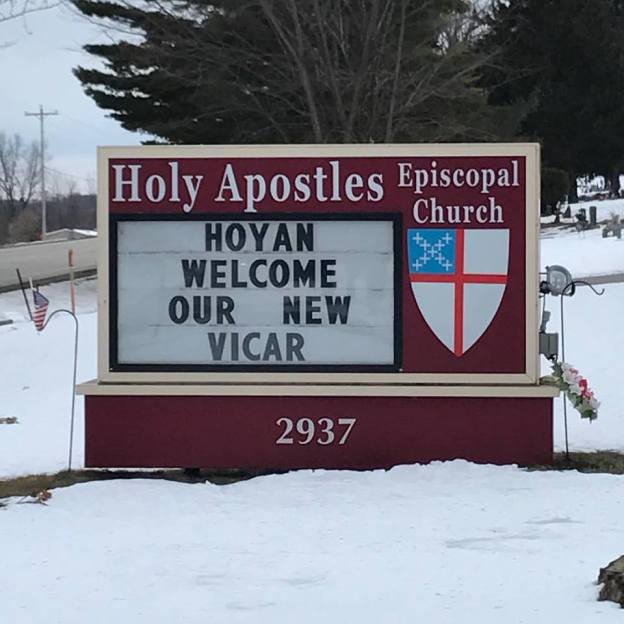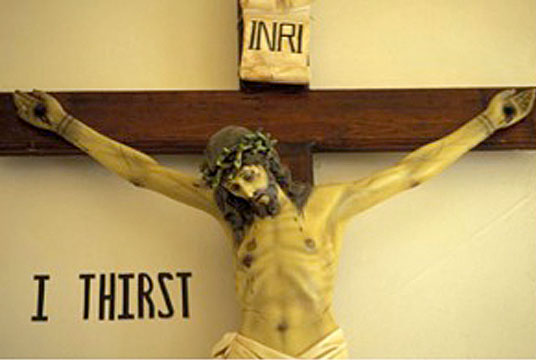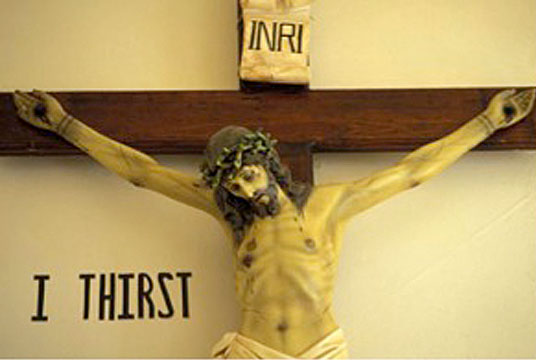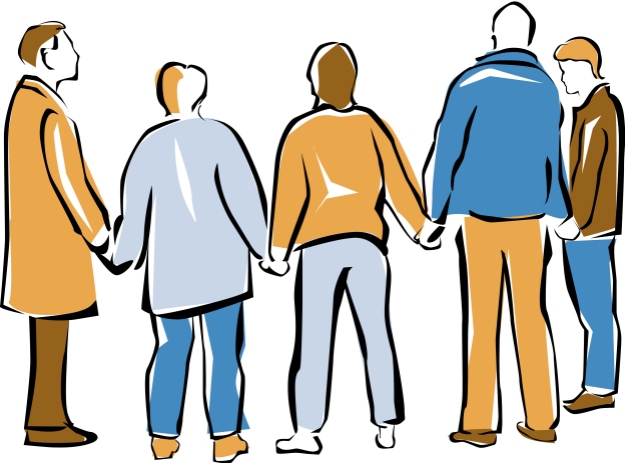Note: Today’s sermon was my first as vicar of Church of the Holy Apostles in Oneida, WI. Founded as the Oneida Indian Mission in 1702 in New York State and moved to Wisconsin in 1822, Holy Apostles is the oldest Native American mission in the Episcopal Church.
+ + + + +
“Plant in every heart, we pray, the love of him who is the Savior of the world, our Lord Jesus Christ.”
Like Jesus we have not only titles, lots of them, but also a name.
Jesus’ Titles
Jesus’ most common title, Christ, isn’t really Jesus’ last name (and H. is not his middle initial). Christ is the Greek adjective that means Anointed; it’s the same as the Hebrew word Messiah.
In the stories of his birth that we read from Matthew and Luke last weekend and this morning, Jesus has another title, Emmanuel, which means “God is with us.”
Perhaps some of you have seen that poster that lists many of his other titles?

But perhaps Jesus’ most important title is Lord.
The first proclamation of faith after the resurrection – and from the patron of my former parish “doubting Thomas” no less – was “My Lord and my God!” (John 20:28).
Jesus is both Lord and Savior. His title is Lord, and his name means Savior.
Jesus’ Name
The name Jesus, according to the angel, means “he will save his people from their sins” (Matt. 1:21).
Paul writes to the Philippians that, because of the self-emptying, obedient love that Jesus demonstrated on the cross,
God also highly exalted him and gave him the name that is above every name, so that at the Name of Jesus, every knee should bend, in heaven and on earth and under the earth, and every tongue should confess that Jesus Christ is Lord, to the glory of God the Father. (Phil. 2:9-11)
From before his birth, Jesus’ name starts to show us who he is and what he is doing.
We have names, too
My name is Rodger – Lindsay – Patience.
My name comes from my father and grandfathers and our Scottish ancestors.
I also have clan names – Ross, McColl, and Lindsay.
You each have names – some of you that I’ve met already, like Ken House (Hoyan), have two names.
Your names may come through your mothers and grandmothers. There were certainly a lot of Betties in the church basement a couple weeks ago when we were tying the cedar ropes that decorate the church for Christmas!
Many of you have clan names, too – Wolf, Turtle, and Bear.
Our names begin to describe us, at least in relationship to other people in our family and clan.
We have titles, too
I have a new title – Vicar.
The kids at St. Thomas have been having fun the last few weeks trying to remember to use another new title “Father” instead of my old title “Deacon.”
I am called a Senior Faculty Member at work. I’m not actually “senior” yet; my boss keeps trying to give me a promotion.
I am a Delta Diamond Medallion™ Member, and I have the luggage tags to prove it.
When we meet for coffee, Richard Ackley jokes and refers to me as “White Male Privilege” – that’s more about entitlement, but it comes from the same root word.
I am also a recovering alcoholic, a title that has transformed my spiritual life in the last few years.
Some of the titles we use are descriptive of who we are; some are aspirational. Some only serve to bring us down; others remind us how far we’ve come.
Beloved
But in the Body of Christ, in the “company of friends” who follow Jesus, we really only have one title, and that is Beloved.
Jesus is Lord, and we are his Beloved. John, who was actually known as the Beloved Disciple even while Jesus was alive, wrote that
God so loved the world that he gave his only Son so that everyone who believes in him may not perish but may have eternal life. Indeed, God did not send the Son into the world to condemn the world, but in order that the world might be saved through him. (John 3:16-17)
We each have different names that connect us to our families, we each have titles that define our aspirations, but as friends of Jesus we have only one true title.
We are Beloved.
No other title should be allowed to obscure that one or to separate one Beloved child of God from another.
No other title – Episcopal/Methodist, Republican/Democrat, Oneida/White, Packers/Vikings, Christian/Muslim/Jewish, believer/atheist, no family name or clan affiliation – should keep us from sharing our lives with others as Beloved children of God.
Paul insisted that
Just as the body is one and has many members, and all the members of the body, though many, are one, so it is with Christ. For in the one Spirit we were all baptized into one body – Jews or Greeks, slaves or free – and we were all made to drink of one Spirit …. Now you are the body of Christ and individually members of it (1 Cor. 12:12-13; 27)
So as Jesus’s Beloved, it is our joy to cooperate with God and “plant in every heart the love of him who is the Savior of the world.”
We are – first, lasting, and always –
Beloved friends of a loving Savior
who remind God’s other Beloved children
of the self-emptying love of Jesus which is for them, too.
If other people are to believe in Jesus’ saving love, if they are to trust the loving purposes of God, they will have to see that love in his Beloved.
They will have to see it in us.
Amen.


















